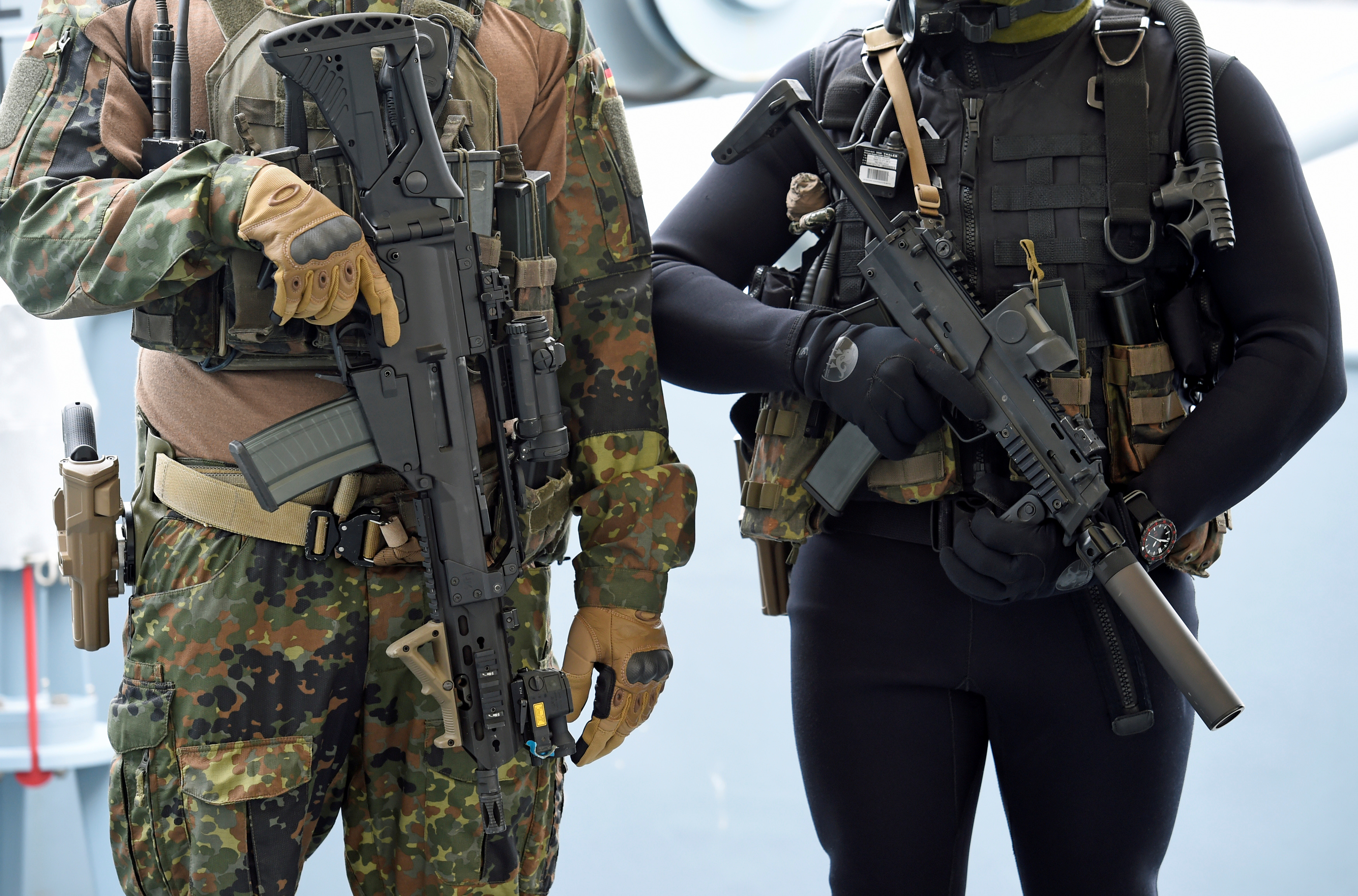As Confederate statues tumble across the U.S. and America once again confronts hard questions about its painful history, commentators have pointed to Germany as a model of a country that has successfully reckoned with its past.
But in the wake of an alleged right-wing terror plot inside the army’s ranks, and some 275 soldiers under investigation for suspected right-wing extremism, Germany’s military has been forced to publicly confront its relationship with its Nazi-era forebear, the Wehrmacht.
Videos by VICE
German Defense Minister Ursula von der Leyen has called for sweeping cultural reforms to the military to completely sever any vestigial ties to the Wehrmacht, including renaming barracks that bear the names of WWII-era officers and launching sweeping searches to uncover Nazi-era memorabilia.
“The Bundeswehr has to send signals both internally and externally that it is not rooted in the tradition of the Wehrmacht,” she told Germany’s Bild am Sonntag newspaper earlier this year.
Leyen’s frank demands for reform have upset many in the military establishment. But former recruits told VICE News that the legacy of the Wehrmacht has remained a source of inspiration for a fringe of far-right sympathizers and that a “spring clean” of the Bundeswehr culture was badly needed to make sure extremism has no home in the forces.
Unspoken extremism
For many Germans, the fact that there are barracks named after military heroes of the Third Reich at all has come as a surprise, an anomaly amid the comprehensive de-Nazification that has swept through postwar Germany’s other institutions.
“When the discussion came up, I thought, is it really true there are barracks named after Wehrmacht officers?” Johannes Tuchel, a political scientist at the Freie Universität Berlin, and head of the German Resistance Memorial Center, told VICE News.
The Bundeswehr’s own “Tradition Decree,” the guiding document setting out how it should understand its own values and identity, explicitly states that it should not look on the Wehrmacht as the foundation — with the exception of the elements within the Wehrmacht who attempted to assassinate Hitler in a failed 1944 plot. But as von der Leyen’s call for reform indicates, this hasn’t been as clear-cut in practice.
“There were no formally spoken ties, but every training officer I had held the Wehrmacht ideal up, and they told us about that.”
When the Bundeswehr was formed in 1955, like many institutions in post-war Germany, it drew, out of necessity, on the skills of many who had served in its wartime equivalent. In the following years, a number of leading Wehrmacht military figures — men such as Luftwaffe pilot Capt. Hans-Joachim Marseille, Iron Cross recipient Sgt. Diedrich Lilienthal, and Maj.-Gen. Adelbert Schulz, commander of the 7th Panzer Division — were honored with barracks named after them.
Wehrmacht memorabilia has remained on display in certain barracks ever since — something permitted by the Tradition Decree under the hazy proviso that they’re displayed for “research and educational purposes.”
As a result, the Wehrmacht has remained a source of inspiration for some within the ranks, former recruits told VICE News.
“There were no formally spoken ties, but every training officer I had held the Wehrmacht ideal up, and they told us about that,” said Philipp Liesenhoff, an analyst who served from 2006-2007.

“At first it didn’t bother me, or any of us, until you realised that these were the same guys who would listen to straight-up right-wing-extremist bands during their workouts.”
Critics fear that the ambiguities in practice around how the Wehrmacht legacy is treated within the Bundeswehr could be sending mixed messages to the small fringe of right-wing extremists who make it into the forces — whether drawn out of a natural affinity for a hierarchical and patriotic institution, to gain access to weapons and military training, or because of a “Wehrmacht fetish.” They say a clearer message needs to be sent to repudiate the Wehrmacht legacy and signal to potential far-right recruits that it is not a place where extremist attitudes will be tolerated.
The terror plot
Fears of extremism in the ranks were confirmed when a right-wing terror cell involving two Bundeswehr soldiers was uncovered in April. The incident sent shockwaves through German society.
Police say the cell’s alleged leader — a Bundeswehr lieutenant known as Franco A. — had successfully created a false identity as a Syrian refugee, under which he had been granted asylum, collected monthly welfare payments, and intended to carry out a “false flag” attack with the goal of stoking public anger toward immigrants and refugees.
The case blew open long-held concerns surrounding right-wing extremism in the Bundeswehr and its leadership’s failure to adequately respond to obvious warning signs. Franco A.’s superiors had failed to notify military counterintelligence when concerns were flagged about an academic paper he authored arguing that immigration was causing a “genocide” in Western Europe. And a search of Franco A.’s barracks room after his arrest uncovered an assault-rifle case carved with a swastika, the letters HH (standing for Heil Hitler) inscribed on the wall and a Nazi-era pamphlet featuring a Wehrmacht soldier.
“Even though they knew I was an active neo-Nazi who was making anti-Semitic jokes, they didn’t stop training me on weapons.”
Since the plot was uncovered, there have been further embarrassments. State prosecutors in the city of Tübingen announced this month that they are investigating a party held by elite special forces in which soldiers allegedly gave the Hitler salute, played right-wing-extremist punk music, and organized a pig’s head toss — a favorite pastime for neo-Nazis due to the perceived offense it would cause to Muslims or Jews.

The 275 cases of suspected far-right extremism currently under investigation — including cases where soldiers gave Hitler salutes or yelled “Sieg heil!” — represent a tiny number when viewed in the context of the Bundeswehr’s 178,000 soldiers. But VICE News spoke to a number of former German soldiers who said that their Bundeswehr superiors had tended to ignore some signs of potential right-wing extremism on display during their service.
“Guys would come back to the barracks after a few drinks — one guy shouts ‘Sieg!’, the other shouts ‘Heil!’,” said Liesenhoff. “The superiors will tend to excuse it as ‘just guys blowing off steam.’ But that’s not what it is.”
Christian Weissgerber, a Berlin-based student who was a committed neo-Nazi when he joined the Bundeswehr eight years ago, says three of the seven recruits in his room shared his far-right views. He was kicked out of the Bundeswehr after being reported for making anti-Semitic comments, but he believes military authorities responded laxly by continuing to give him weapons training in the period before he was finally expelled, even after his extremism had come to light.
“Even though they knew I was an active neo-Nazi who was making anti-Semitic jokes, they didn’t stop training me on weapons,” Weissgerber, who has long since recanted his views and is now an anti-racism campaigner, told VICE News.
“We have a broken history”
The criticism of the Bundeswehr has rankled many in the military establishment. Georg Pazderski, leader of the right-wing Alternative für Deutschland party in the Berlin state parliament, told VICE News he believed that any extremist elements in the forces merely reflected the political makeup of the wider society. (According to Germany’s domestic intelligence service, the number of right-wing extremist sympathizers in the country is growing — 23,100 in 2016 compared with 22,600 the previous year — and becoming more violent, committing 1,600 violent offenses last year, an increase of 13.6 percent.)
Speaking in the lobby of Berlin’s House of Representatives, Pazderski decried the calls for reform as an unwarranted “witch hunt” by liberals targeting the culture of a conservative institution they do not understand, complaining that the Bundeswehr was being needlessly stripped of its traditions in the drive to purge all links to the Wehrmacht.
“It’s very difficult in Germany. We have a broken history,” he told VICE News. “But to say everybody who served in the Wehrmacht is bad… is in my opinion nonsense. If you’re looking at who founded the Bundeswehr, it was all these people who had a role in the Wehrmacht.”
“You cannot choose history; you have to accept it.”
As the Bundeswehr proceeds with its review of the Tradition Decree — a process that is expected to take two years, involving the input of hundreds of historians, social scientists and soldiers through rounds of panel discussions — it is yet to be determined exactly how the institution will make sense of its military past. For Tuchel, a political scientist at German Resistance Memorial Center, the best response is to draw from to whatever positive moral examples can be drawn from the period, while acknowledging and disavowing the evils that went with it.
The same principles could be applied in the U.S. in its current debate, he said, hailing the renewed discussion of the country’s dark history as “a great thing.”
“You cannot choose history; you have to accept it,” he said. “The necessary step is the discussion — how to deal with these historical events from our modern point of view, what parts of our past we will honor, and see as an example for life today.”
More
From VICE
-

Screenshot: X @FF_XIV_EN, Square Enix -

WC Fields (Photo by Universal/Getty Images) -

(Photo by Scott Dudelson/Getty Images) -

Photo by Fight For The Future
